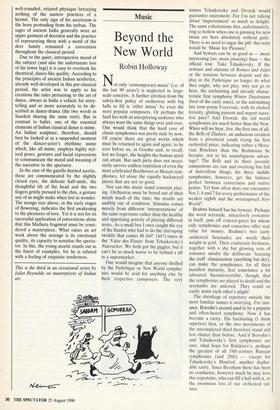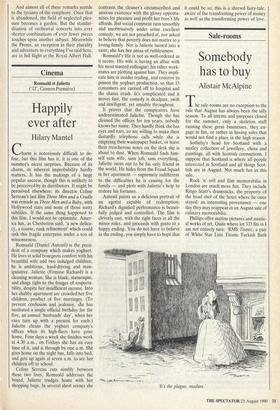M usi c
Beyond the New World
Robin Holloway
Not only 'contemporary music' (i.e. of the last 90 years!) is neglected in large- scale concerts. A further attrition from the safety-first policy of orchestras with big halls to fill is 'other music' by even the most popular composers. Or perhaps the fault lies with an unexploring audience who always want the same things over and over. One would think that the hard core of classic symphonies was pretty stale by now. Of course there are great works which must be returned to again and again, to be ever before us, as Goethe said, to recall, lest we forget, the heights the human spirit can attain. But such piety does not neces- sarily survive endless repetition of even the most celebrated Beethoven or Mozart sym- phonies, let alone the equally hackneyed pieces that are not so good.
Nor can this music stand constant play- ing. Orchestras must be bored out of their minds much of the time; the results are audibly out of condition. Stimulus comes merely from different 'interpretations' of the same repertoire rather than the healthy and appetising activity of playing different notes. As a small boy I once caught the eye of the flautist who had to do the chirruping twiddle that comes 48 (64? 144?) times in the 'Valse des Fleurs' from Tchaikovsky's Nutcracker. We both got the giggles; but it can't be so much worse to be behind a till in a supermarket.
One would imagine that anyone thrilled by the Pathetique or New World sympho- nies would be avid for anything else by their respective composers. The very
names Tchaikovsky and Dvorak ' would guarantee enjoyment. For I'm not talking about 'improvement' so much as delight. The same exhortations that, unfortunately, ring so hollow when one is gunning for new music are here absolutely without guile. There is no need to sugar the pill: this truly would be 'Music for Pleasure'.
And byways can be as good as — more interesting (no, more pleasing) than — the official tour. Take Tchaikovsky. If the ardours and alarums of Romeo and Juliet or the tensions between despair and dis- play in the Pathetique no longer do what they ought, why not play, why not go to hear, the enchanting and already charac- teristic first symphony Winter Daydreams (best of the early ones), or the astonishing late tone-poem Voyevoda, with its choked ferocity, glinting passion and urgent narra- tive pace? And Dvorak: the old world symphonies are much better than the New. When will we hear, live, the first one of all, the Bells of Zladoce, an audacious creation from a provincial youth trying his first orchestral piece, indicating rather a Mora- vian Bruckner than the Brahmsian he became, not to his unambiguous advan- tage? The Bells and its three juvenile companions are raw and overlong but full of marvellous things; his three middle symphonies, however, get the balance perfect between correctness and native genius. Yet how often does one encounter Nos 5, 6 and 7 for every performance of the weaker eighth and the overexposed New World?
Brahms himself has his byways. Perhaps the word serenade, attractively evocative in itself, puts off concert-goers for whom only symphonies and concertos offer real value for money. Brahms's two early orchestral Serenades are worth their weight in gold. Their exuberant freshness, together with a shy but glowing vein of romance amidst the deliberate 'learning the craft' classicisation (anything but dry), can make the symphonies, for all their manifest maturity, feel sometimes a bit laboured. Incontrovertible, though, that the symphonies are played to death and the serenades are unloved. They could so easily assist each other's plight!
The shrinkage of repertory outside the most familiar names is worrying. For inst- ance, Borodin's second used to be a popular and often-heard symphony. Now it has become a rarity. His fascinating (I think superior) first, or the two movements of the uncompleted third therefore stand still less chance than before. And if Borodin's and Tchaikovsky's first symphonies are rare, what hope for Balakirev's, perhaps the greatest of all 19th-century Russian symphonies (and 20th) — except for Tchaikovsky's Manfred, another deplor- able rarity. Since Beecham there has been no conductor, however much he may love this repertoire, who can fill a hall with it, to the enormous loss of our orchestral cul- ture. And almost all of these remarks accede to the tyranny of the symphony. Once that is abandoned, the field of neglected plea- sure becomes a garden. But the standar- disation of orchestral concerts into ever shorter combinations of ever fewer pieces touches upon another subject. Meanwhile the Proms, an exception in their plurality and adventure to everything I've said here, are in full flight at the Royal Albert Hall.











































 Previous page
Previous page